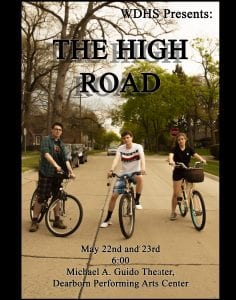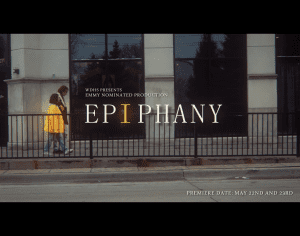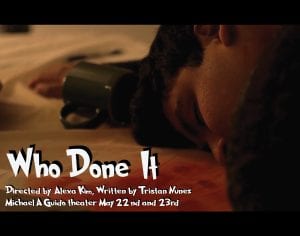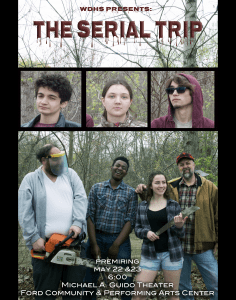Advanced: Who’s going to adapt this story?
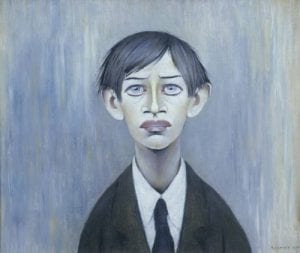 This would make a phenomenal short for next year. Who’s going to adapt it? We’ll need to get permission. Read this awesome story
This would make a phenomenal short for next year. Who’s going to adapt it? We’ll need to get permission. Read this awesome story
Posted in Movie and Video, Movie Making, Video Production and tagged adaptation, screenwriting, story, WDHS by Adam Rauscher with no comments yet.
Advanced Video and Movie Making: Critique the Class
Critique the class! Tear Mr. Rauscher to pieces. Fill out this survey about  how the class went. Seniors, you have until Sunday at 11:59pm. All others, you have until Friday, May 31 at the start of class to fill this out. If you’re a senior in fifth hour, this is optional.
how the class went. Seniors, you have until Sunday at 11:59pm. All others, you have until Friday, May 31 at the start of class to fill this out. If you’re a senior in fifth hour, this is optional.
https://forms.gle/bvbGA6XFATfKQbEW6
Posted in Movie and Video, Movie Making, Video Production and tagged assessment, critique, Homework, Mr Rauscher, tear to pieces, WDHS by Adam Rauscher with no comments yet.
Advanced Video and Advanced Movie Making Screening Info
All managers should report to the Michael A. Guido Theater by 4:30pm on Wednesday to help with set up. All other WDHS students, report by 5:30pm to get ready to open the house. You don’t have to attend both nights, but you need to attend at least one night.
We need parents to help take tickets and guard the doors. If your parents are willing, have them show up with you.
We’re having a WDHS dinner at 9pm on Wednesday, May 22nd at 9pm. This is a chance to say goodbye to our seniors and celebrate ourselves. We’re eating at Leo’s Coney Island at 5575 Greenfield Rd, Dearborn, MI 48126, it’s near the intersection with Ford Road. You should pay for yourself. If you’re not going to attend because of finances, please contact Mr. Rauscher.
If any of you are in fourth hour, please make sure to return your copy of “Save the Cat.”
All seniors, your final reflection is due by 11:59pm on Thursday, May 23rd. If you need the rubric, click Advanced_ Final Reflection.
Posted in Movie and Video, Movie Making, Video Production and tagged assessment, final reflection, michael a guido, premiere, save the cat, screening, seniors, short film, WDHS by Adam Rauscher with no comments yet.
WDHS Film Festival – Wed May 22 and Thu May 23
 The WDHS Film Festival is on Wednesday May 22 and Thursday May 23rd in the Michael A Guido Theater at the Ford Community and Performing Arts Center. See the premiere of 10 short films, nominated for seven Student Emmy awards.
The WDHS Film Festival is on Wednesday May 22 and Thursday May 23rd in the Michael A Guido Theater at the Ford Community and Performing Arts Center. See the premiere of 10 short films, nominated for seven Student Emmy awards.
Every student in all of my classes gets credit for showing up. The students in Advanced Movie Making and Advanced Video must attend at least one night. Students in Studio Productions and U.S. Economics can earn extra credit. Just take a picture of yourself at the theater and share it on social media with the hashtag #WDHS or email it to Mr. Rauscher.
Buy tickets at lunch or from Mr. Rauscher! Or you can buy them at the theater.
Posted in Economics, Movie and Video, Movie Making, Studio, Video Production and tagged economics, Electric Oddity, Epiphany, Extra Credit, Film Festival, short film, student film, The High Road, The Serial Trip, WDHS by Adam Rauscher with no comments yet.
Past Projects
I was wishing a former intern a happy birthday and he reminded me of a video he made for me made several years ago. Take a look at the kind of work I had students doing back then! Also see how much hair I had ten years ago!
Posted in Economics, Movie and Video, Movie Making, Studio, Video Production and tagged dvdepot, hair, internship, past by Adam Rauscher with no comments yet.
All Video Classes Extra Credit
The List: Watching Old Movies
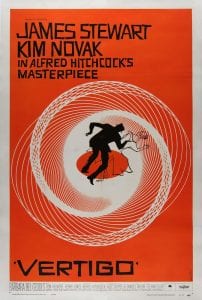 Do you want to earn extra credit? You can earn up to 5 points of extra credit! For each movie you watch!
Do you want to earn extra credit? You can earn up to 5 points of extra credit! For each movie you watch!
Watch any movie on The List (see link below). Write a paragraph about whether you liked it and why. Cite three specific reasons using the language of film critique we have discussed (see rubric below).
There are also ways to earn extra extra credit! Plus 1 extra point if it was made before 1990 and another extra if it was made before 1939! Plus another if it is in a foreign language! Foreign language movies are highlighted in
This list contains a wide variety of movies, some of which are not appropriate for younger viewers. Check with your parents before watching any movie rated R. Also, some movies are “Not Rated.” If they’re made before 1967, they’re appropriate. If they’re made after that, they’re probably not.
Finished paragraphs can be submitted to Mr Rauscher on paper or by (rauscha@dearbornschools.org). Make sure to put the name of the movie and “The List” in the title. You must submit before Friday, June 7 at 11:59pm.
The List
(https://docs.google.com/document/d/1qDIu4n_aMNdWlFDxzW7GDkVLFyfWX1KzE9BUdc2n78g/edit?usp=sharing)
The Rubric
- You state clearly how you feel about the movie (2 points)
- Three specific reasons are given for your feelings. Each reason mentions a specific moment from the film and uses the language of critique we learned in class (3 points)
- The movie is in a foreign language (1 point)
- The movie was made before 1990 (1 point)
- The movie was made before 1939 (1 point)
Total Score: /5
Posted in Movie and Video, Movie Making, Studio, Video Production and tagged character, cinematography, Extra Credit, film critique, screenwriting, The List, Vocabulary by Adam Rauscher with no comments yet.
Offstage
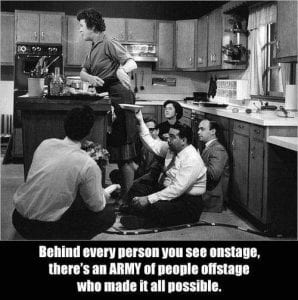 This is talking about all of us!
This is talking about all of us!
Posted in Movie and Video, Movie Making, Studio, Video Production and tagged behind the scenes, meme by Adam Rauscher with no comments yet.
Video: Oscars Change Format
https://www.indiewire.com/2019/02/academy-oscars-abc-streaming-four-categories-during-oscar-show-commercial-breaks-1202043346/
The Academy of Motion Pictures Arts and Sciences run the Oscars. They have recently determined that during this year’s broadcast, editing and cinematography will be handed out during commercial breaks so the audience at home will not see them. How do you feel about this? Post in the comments.
Also, remember, the extra credit assignment for all three video classes is due on Tuesday next week. You can find it here:
Posted in Movie and Video, Movie Making, Studio, Video Production and tagged Academy Awards, cinematography, editing, Oscars, snub by Adam Rauscher with no comments yet.
Advanced Video and Movie Making: Homework – Scheduling worksheet and Remind
Homework: Scheduling Worksheet
and Remind
A reminder to all students in Advanced Movie Making and Advanced Video, I need your
contract with the scheduling worksheet by Tuesday. You can download it here: Contract Part of the contract is agreeing to sign up for the Remind. You can do so at https://www.remind.com/join/rauscha. The scheduling worksheet and signing up for the Remind count as two separate homework assignments. Don’t lose the easy points, guys!
Posted in Movie and Video, Movie Making, Video Production and tagged Homework, Remind, Scheduling by Adam Rauscher with no comments yet.
Video Extra Credit Assignment
To get you through the rough weather, here is an extra credit assignment! It will be due Tuesday February 19th. It is worth up to 20 formative points. This is for all three video classes.
Watch one of the movies listed below (all are available on Netflix) and answer the question associated with it. Write at least two paragraphs. Your ability to cite specific details will affect your score.
The Third Man (1949), Not Rated – Pulp novelist 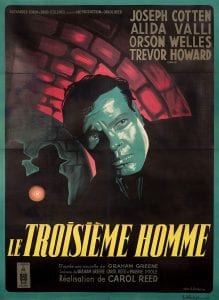 Holly Martins travels to shadowy, postwar Vienna, only to find himself investigating the mysterious death of an old friend, Harry Lime.
Holly Martins travels to shadowy, postwar Vienna, only to find himself investigating the mysterious death of an old friend, Harry Lime.
The introduction of Orson Welles’ character is often called the greatest character introduction ever. What techniques does the movie use before he appears and when he appears to make this so?
Schindler’s List (1993), R – In German-occupied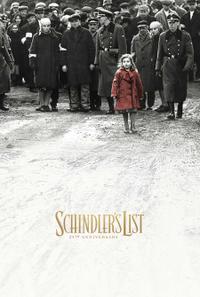 Poland during World War II, Oskar Schindler gradually becomes concerned for his Jewish workforce after witnessing their persecution by the Nazi Germans.
Poland during World War II, Oskar Schindler gradually becomes concerned for his Jewish workforce after witnessing their persecution by the Nazi Germans.
Critics praise Steven Spielberg and Janusz Kaminski’s use of color. How do their color choices underline the story, themes, and questions of the film?
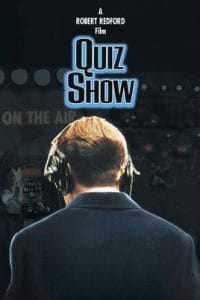 Quiz Show (1994), PG-13 – A young lawyer, Richard Goodwin, investigates a potentially fixed game show. Charles Van Doren, a big time show winner, is under Goodwin’s investigation.
Quiz Show (1994), PG-13 – A young lawyer, Richard Goodwin, investigates a potentially fixed game show. Charles Van Doren, a big time show winner, is under Goodwin’s investigation.
This is the film that put television on trial. How does the film try to emulate techniques of television (acting, cinematography, editing, music, set design)?
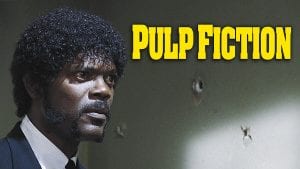 Pulp Fiction (1994), R – The lives of two mob hitmen, a boxer, a gangster’s wife, and a pair of diner bandits intertwine in four tales of violence and redemption.
Pulp Fiction (1994), R – The lives of two mob hitmen, a boxer, a gangster’s wife, and a pair of diner bandits intertwine in four tales of violence and redemption.
Pulp Fiction uses a MacGuffin, an object that has no meaning beyond being a plot point. Why did the filmmakers choose to never actually say what the MacGuffin is? How does this affect the movie?
 Monty Python and the Holy Grail (1975), PG – King Arthur and his Knights of the Round Table embark on a surreal, low-budget search for the Holy Grail, encountering many, very silly obstacles.
Monty Python and the Holy Grail (1975), PG – King Arthur and his Knights of the Round Table embark on a surreal, low-budget search for the Holy Grail, encountering many, very silly obstacles.
Great satire isn’t just references. It is critical of its source material. What does this film say about the Arthurian legend? How else does it criticize movies, stories and legends?
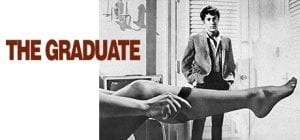 The Graduate (1967) – A disillusioned college graduate finds himself torn between his older lover and her daughter.
The Graduate (1967) – A disillusioned college graduate finds himself torn between his older lover and her daughter.
The Graduate made superstars of musicians Simon and Garfunkel. How does the movie’s use of music affect its mood, tone, and story? How does the music affect its place in history?
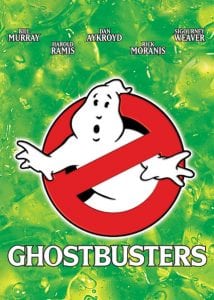 Ghostbusters (1984), PG – Three former parapsychology professors set up shop as a unique ghost removal service.
Ghostbusters (1984), PG – Three former parapsychology professors set up shop as a unique ghost removal service.
Dan Akroyd (star and co-writer) is obsessive about the paranormal. How does the movie walk the fine line between seriously exploring supernatural events and mocking those who believe in them at the same time?
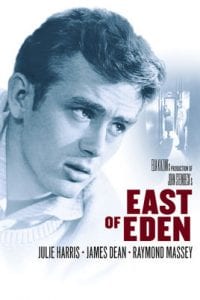 East of Eden (1955), PG – A willful young man contends against his brother for the attention of their religious father while reconnecting with his estranged mother and falling for his brother’s girlfriend.
East of Eden (1955), PG – A willful young man contends against his brother for the attention of their religious father while reconnecting with his estranged mother and falling for his brother’s girlfriend.
James Dean represented a departure from the strong silent types that starred in movies before. What types of choices in acting mark him as different?
Clerks (1994), R – A day in the lives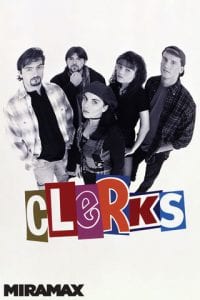 of two convenience clerks named Dante and Randal as they annoy customers, discuss movies, and play hockey on the store roof.
of two convenience clerks named Dante and Randal as they annoy customers, discuss movies, and play hockey on the store roof.
How does the low budget aesthetic (artistic style) of Clerks work with its story and characters?
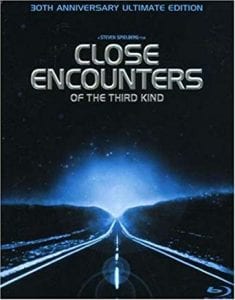 Close Encounters of the Third Kind (1977), PG – Roy Neary, an electric lineman, watches how his quiet and ordinary daily life turns upside down after a close encounter with a UFO.
Close Encounters of the Third Kind (1977), PG – Roy Neary, an electric lineman, watches how his quiet and ordinary daily life turns upside down after a close encounter with a UFO.
Close Encounters is very concerned with different languages. What languages and forms of communication are depicted? How do the themes and story relate to language?
Posted in Blogs, Movie and Video, Movie Making, Studio, Video Production and tagged acting, aesthetic, character, cinematography, Clerks, Close Encounters, Close Encounters of the Third Kind, Dan Akroyd, direction, East of Eden, editing, Extra Credit, film critique, Ghostbusters, introduction, James Dean, Janusz Kaminski, MacGuffin, Monty Python and the Holy Grail, music, Orson Welles, satire, Schindler's List, screenwriting, Shot Selection, Simon and Garfunkel, Steven Spielberg, television, The Graduate, The Third Man by Adam Rauscher with no comments yet.
